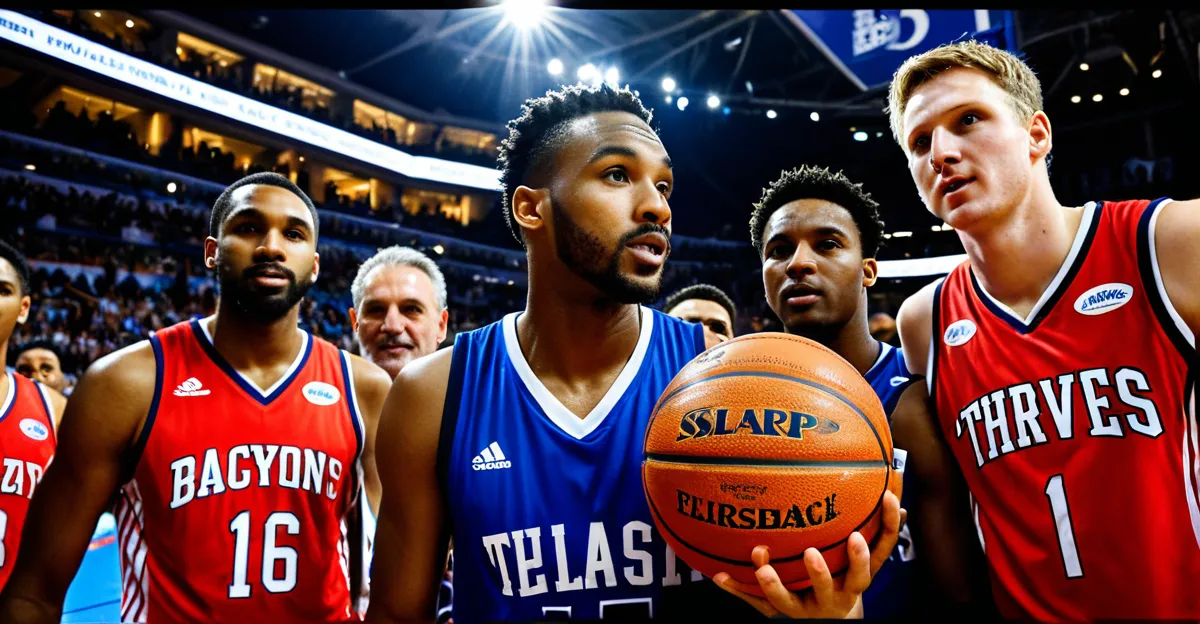Actionable strategies for UK basketball teams to achieve international success
To drive global success for teams, UK basketball must implement actionable guidance grounded in proven frameworks. A key strategy is enhancing player development by integrating advanced training regimens tailored to international play styles, focusing on agility, shooting accuracy, and defensive versatility. This approach addresses the fast-paced, physically demanding nature of global competitions.
Adapting tactics based on opponent analysis is crucial. UK teams should invest in comprehensive scouting and video review to understand diverse international strategies and adjust their gameplay accordingly. For instance, European teams often emphasize ball movement, while others rely on physicality. Recognizing these differences improves preparation and performance.
Also read : Discover the top must-see basketball events in the uk
Moreover, overcoming challenges unique to UK basketball on the world stage—such as limited exposure to elite competition and resource constraints—requires strategic partnerships with overseas clubs and participation in international tournaments. This exposes players to varied playing styles and elevates competitive experience. By following these UK basketball international strategies, teams can build resilience and sharpen skills essential for success against high-caliber opponents worldwide.
Player development practices for global competitiveness
To achieve global competitiveness in international basketball, player development must focus on a holistic approach combining technical, tactical, and mental skills. Technical skills such as ball handling, shooting, and defensive positioning are foundational. Tactical development involves understanding game strategies that align with international basketball styles, which vary from region to region but share common elements like fast-paced transition and spacing.
Additional reading : Maximize your game-day thrill: tips for uk basketball enthusiasts
Integrating international standards into training programmes is essential. This means adopting best practices from leading basketball nations, including advanced analytics, strength and conditioning regimens, and exposure to diverse playing styles. UK coaches and development staff must stay updated on global trends and incorporate drills that simulate international game speeds and physicality.
Creating clear pathways for youth and emerging UK talent ensures a steady pipeline. This includes identifying prospects early, providing them with opportunities to train abroad or compete against international opponents, and offering tailored support to bridge skill gaps. Consistently applying these player development practices enhances the UK’s prospects for success on the international stage, empowering athletes to perform confidently against global competition.
Effective recruiting and team building for international play
Recruiting for basketball at the international level requires targeting a mix of UK international players and global talent to create a well-rounded team. Identifying diverse prospects involves analyzing skills, adaptability, and cultural fit. Basketball recruitment strategies must extend beyond domestic borders to tap into emerging markets, ensuring a dynamic roster.
Successful team building hinges on balancing the integration of domestic and international players. This involves fostering communication and cohesion, so different playing styles and backgrounds blend cohesively. Teams benefit from emphasizing shared goals and trust, which encourage collaboration on and off the court.
To optimize recruitment, leveraging advanced scouting networks and data analytics is crucial. Analytics provide objective insights into player performance metrics, assisting in precise talent evaluation. Combining traditional scouting with technology enables coaches to make informed decisions and build competitive international teams that excel tactically and culturally.
Coaching approaches to excel against global opponents
In the realm of basketball coaching, UK coaches face the challenge of adapting to diverse international competition styles. Modern coaching philosophies emphasize flexibility, prioritizing players’ ability to adjust during games. This approach counters the varied tactics observed globally, where physicality, pace, and tactical discipline differ widely.
To succeed against global opponents, UK coaches focus on developing strategies tailored not only to their team’s strengths but also to neutralize specific international trends. For example, opposing teams may favor aggressive defensive pressure or pace-heavy offenses. Identifying these patterns allows coaches to prepare effective countermeasures.
Another critical aspect is continuous coach education. UK coaches increasingly participate in global clinics and workshops to absorb best practices from basketball powerhouses worldwide. Exposure to different coaching methods ensures their strategies remain current and competitive.
This commitment to evolving coaching methods and strategy development is essential. UK coaches who integrate these elements demonstrate improved performance when competing internationally, leveraging a blend of homegrown expertise and global insights.
Preparing for International Tournaments and Competitions
Success for UK basketball teams in international arenas depends heavily on thorough international preparation. Teams adopt structured pre-tournament preparation routines that build physical conditioning and sharpen tactical awareness. These routines often include multiple phases: skill refinement, team strategy development, and mental resilience training, ensuring athletes remain focused and adaptable under pressure.
Simulating the unique intensity and pace of international competition readiness is crucial. Coaches replicate game-day atmospheres through scrimmages mimicking opponents’ styles and enforcing strict time constraints. This approach acclimates players to the rapid decision-making and physical demands they will face abroad, reducing performance drop-offs.
Managing logistical factors, such as travel, scheduling, and recovery, rounds out effective preparation. Coordinating flights, time zone adjustments, and nutrition plans helps maintain peak condition. Emphasizing rest and recovery protocols allows players to perform consistently, limiting fatigue and injury risks during demanding match schedules.
By integrating these elements, UK basketball teams position themselves for competitive excellence on the international stage, balancing physical, tactical, and logistical challenges with precision.
Marketing and brand-building for worldwide recognition
Effective basketball marketing hinges on crafting a compelling narrative that resonates across cultures. Teams seeking global brand recognition must showcase their unique stories in ways that connect with diverse audiences. This process goes beyond simply promoting games; it involves highlighting values, achievements, and community impact.
Digital platforms and social media are invaluable tools for expanding reach. By sharing engaging content—game highlights, player interviews, and behind-the-scenes glimpses—teams create lasting impressions. Consistent interaction on these channels fosters a loyal global fanbase eager for fresh updates.
Partnering with global influencers and established brands further amplifies exposure. Collaborations introduce teams to wider demographics while lending credibility. For UK teams international exposure requires strategic alliances with reputable figures who embody the sport’s spirit, enhancing appeal in unfamiliar markets.
Combining storytelling, digital savvy, and influential partnerships crafts a cohesive basketball marketing approach. This approach not only elevates the global brand but also cements UK teams’ presence on the international stage, inviting new fans to join their journey.
Securing sponsorships and building strategic partnerships
Securing basketball sponsorship is crucial for UK teams looking to expand their financial resources and competitive edge. Approaching and negotiating with international sponsors requires a clear strategy that highlights the team’s unique value and market reach. Teams must demonstrate how sponsorship can enhance brand visibility both locally and abroad, creating a win-win scenario.
When engaging potential backers, emphasizing how this partnership aligns with their marketing goals is essential. This could include offering logo placement, social media integration, or exclusive event access. Such benefits make the collaboration attractive and increase the likelihood of securing funding.
Building strong strategic partnerships involves ongoing communication and delivering on promises. UK team funding often relies on maintaining trust and showcasing progress through regular updates and shared successes. Crafting mutually beneficial collaboration opportunities means understanding the sponsor’s needs as deeply as your own, ensuring long-term support and investment in the team’s growth.
Networking and learning from international basketball successes
Building robust basketball networking channels is crucial for elevating the UK basketball scene. By forging connections with internationally successful teams and organisations, UK basketball professionals gain firsthand insight into international best practices that drive performance and growth.
Participating in global basketball forums, clinics, and events allows coaches, players, and administrators to immerse themselves in cutting-edge techniques, tactical advancements, and innovative training methodologies. Such exposure enriches the UK basketball community’s knowledge base, equipping them with practical solutions to local challenges.
Moreover, UK exchange programmes provide structured opportunities for direct collaboration. Hosting international experts or sending UK talent abroad fosters bilateral learning and cultural exchange, which is instrumental in adapting global strategies to the UK context. These collaborations also promote long-term partnerships that sustain continual improvement.
In essence, effective basketball networking combined with exposure to international best practices through varying formats — including exchange programmes — creates a dynamic learning ecosystem. This ecosystem not only nurtures talent but also aligns UK basketball with evolving global standards, enhancing competitiveness and visibility on the world stage.
Real-world case studies: UK teams shining abroad
UK basketball case studies reveal how several teams have left a mark on the global stage through strategic play and strong leadership. A key factor in these team achievements is their ability to blend homegrown talent with international experience, creating versatile squads that adapt well during high-pressure matches.
One notable example is UK-based teams excelling in European competitions, showcasing both tactical discipline and physical resilience. These teams often implement game plans emphasizing swift transitions and coordinated defense, a strategy that has paid off in multiple tournaments abroad.
Analysing these global success stories highlights the importance of investment in player development and sports science, which support consistent performance levels. Moreover, effective scouting and tailored training programs have proven essential for maintaining competitive edges internationally.
The lessons learned from these UK basketball case studies point to replicable models: fostering teamwork, embracing data-driven decision-making, and cultivating mental toughness. These elements equip teams not only to compete successfully overseas but also to inspire domestic leagues to raise their standards and ambition.
Expert advice for UK basketball teams aiming for global impact
Understanding the intricacies of international basketball requires more than local experience. Basketball expert insights emphasize the need for UK teams to blend strong fundamentals with adaptability. Coaches advise prioritizing player development tailored to global standards, focusing on physicality, strategic thinking, and versatile skillsets. Immediate implementation of rigorous training programs reflecting these elements can dramatically raise competitiveness.
Common pitfalls include underestimating the pace and physical demands of international play, as well as neglecting cultural and tactical differences encountered abroad. UK coaching advice highlights the importance of studying opponent strategies and preparing players mentally for diverse environments. To avoid these issues, teams should schedule frequent international friendlies or tournaments that simulate elevated competition levels.
For sustained success, international team guidance advocates continuous learning via workshops and collaboration with experienced foreign coaches. Emphasizing open communication, embracing data analytics for performance evaluation, and fostering resilience are crucial. By following these expert recommendations, UK basketball teams can progressively enhance their global presence and impact on the world stage.



